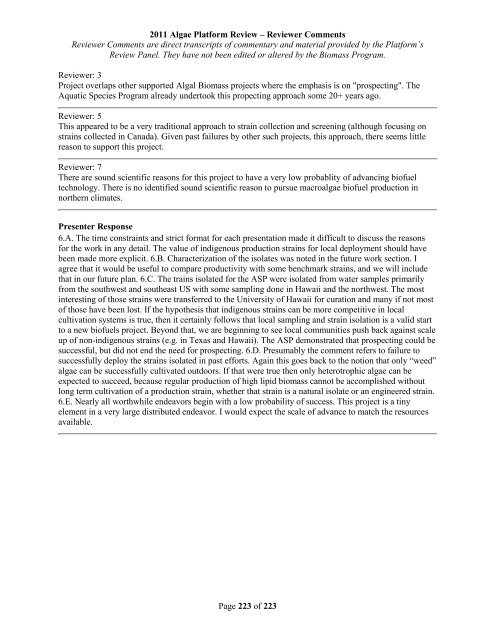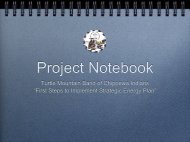Reviewer Comments - EERE
Reviewer Comments - EERE
Reviewer Comments - EERE
Create successful ePaper yourself
Turn your PDF publications into a flip-book with our unique Google optimized e-Paper software.
2011 Algae Platform Review – <strong>Reviewer</strong> <strong>Comments</strong><br />
<strong>Reviewer</strong> <strong>Comments</strong> are direct transcripts of commentary and material provided by the Platform’s<br />
Review Panel. They have not been edited or altered by the Biomass Program.<br />
<strong>Reviewer</strong>: 3<br />
Project overlaps other supported Algal Biomass projects where the emphasis is on "prospecting". The<br />
Aquatic Species Program already undertook this propecting approach some 20+ years ago.<br />
<strong>Reviewer</strong>: 5<br />
This appeared to be a very traditional approach to strain collection and screening (although focusing on<br />
strains collected in Canada). Given past failures by other such projects, this approach, there seems little<br />
reason to support this project.<br />
<strong>Reviewer</strong>: 7<br />
There are sound scientific reasons for this project to have a very low probablity of advancing biofuel<br />
technology. There is no identified sound scientific reason to pursue macroalgae biofuel production in<br />
northern climates.<br />
Presenter Response<br />
6.A. The time constraints and strict format for each presentation made it difficult to discuss the reasons<br />
for the work in any detail. The value of indigenous production strains for local deployment should have<br />
been made more explicit. 6.B. Characterization of the isolates was noted in the future work section. I<br />
agree that it would be useful to compare productivity with some benchmark strains, and we will include<br />
that in our future plan. 6.C. The trains isolated for the ASP were isolated from water samples primarily<br />
from the southwest and southeast US with some sampling done in Hawaii and the northwest. The most<br />
interesting of those strains were transferred to the University of Hawaii for curation and many if not most<br />
of those have been lost. If the hypothesis that indigenous strains can be more competitive in local<br />
cultivation systems is true, then it certainly follows that local sampling and strain isolation is a valid start<br />
to a new biofuels project. Beyond that, we are beginning to see local communities push back against scale<br />
up of non-indigenous strains (e.g. in Texas and Hawaii). The ASP demonstrated that prospecting could be<br />
successful, but did not end the need for prospecting. 6.D. Presumably the comment refers to failure to<br />
successfully deploy the strains isolated in past efforts. Again this goes back to the notion that only “weed”<br />
algae can be successfully cultivated outdoors. If that were true then only heterotrophic algae can be<br />
expected to succeed, because regular production of high lipid biomass cannot be accomplished without<br />
long term cultivation of a production strain, whether that strain is a natural isolate or an engineered strain.<br />
6.E. Nearly all worthwhile endeavors begin with a low probability of success. This project is a tiny<br />
element in a very large distributed endeavor. I would expect the scale of advance to match the resources<br />
available.<br />
Page 223 of 223




